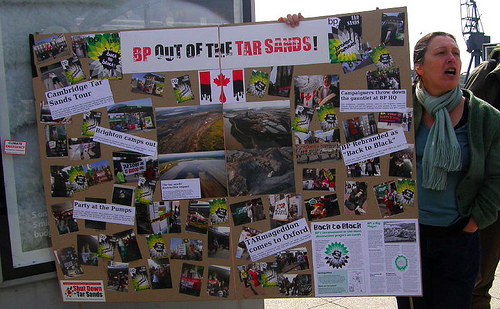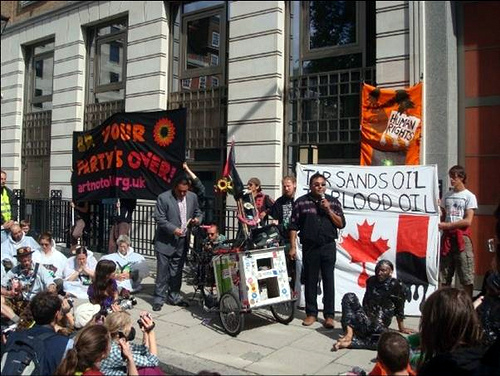It’s not often that the people who run transnational corporations
face their critics in person. Indeed, it’s the job of a small army of
press officers, PR agencies, lawyers and
security guards to ensure that they don’t have to. But every now and
then, dissent invades their carefully created corporate comfort zone,
and the results are always very interesting.
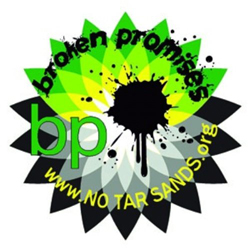
(New Internationalist)
On Thursday, I attended the Annual General Meeting of BP. Britain’s biggest company is famous for practically inventing greenwash with its ‘Beyond Petroleum’ rebrand a decade ago, which did a pretty impressive job of distracting attention from the fact that 98% of the company’s profits were still coming from oil and gas.
The oil
giant has recently come under fire for its decision to invest in the
monumentally destructive tar sands extraction in Alberta, Canada - see
my recent article, ‘Taking on Tarmageddon’. It’s coming late to the tar sands party — all its rivals are already in there. BP
still hasn't made the final decision to go ahead, and this is
increasingly being seen as a litmus test for the future viability of
so-called ‘unconventional oil’ — the growing penchant for going after
ever more expensive, carbon-intensive sources of oil, rather than
making the shift towards alternative fuels and renewables.

Jess Worth is co-editor of the New Internationalist.
'Taken out and shot'
A grassroots movement has sprung up in the UK, vowing to keep BP out of the tar sands. In the fortnight leading up to the AGM, activists in several different cities shut down BP petrol stations. Watch this video of the glorious 200-strong ‘Party at the Pumps' in Shepherd’s Bush on 10th April.
Meanwhile, an expertly orchestrated shareholder campaign was breaking new ground. A coalition of 150 BP shareholders, united in their deep concern about BP’s proposed move into what is being called ‘the world’s most destructive project’, tabled a resolution to be voted on at the company’s AGM. The resolution very reasonably asked for BP to be much more open about the various risks — financial, environmental, social and legal — involved in the project. The coalition, spearheaded by a small NGO called FairPensions and including progressive investors, trade unions, and churches, then set about encouraging ordinary people to write to their pension fund, insurance company or bank and ask it to support the resolution on their behalf.
Whilst to many of us this may look like a standard NGO campaigning tactic, in the City it was apparently perceived as an upstart act of aggression. One trustee was heard to remark; ‘whoever got pension members to e-mail their pension funds should be taken out and shot!’
Nevertheless, an unprecedented 5000 people did — recognising, perhaps, that we are the ultimate owners of these companies that are rampaging across the globe without a care for our futures, and it’s about time we called them to account. In response, BP's schmooze machine went into overdrive, throwing all the company’s considerable resources into persuading shareholders that there really was no reason for alarm. They could extract oil from the tar sands in an ‘environmentally friendly’ way, and they needed to, to meet future demand for oil.
The cracks start to show
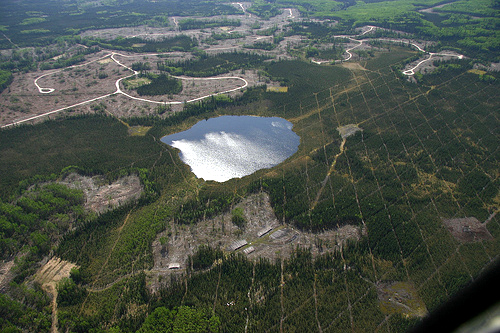
The “in-situ” mining process that BP are hoping to use in the tar sands. (New Internationalist)
So the stage was set for a dramatic showdown at the AGM
itself, last Thursday. As shareholders arrived at the Excel centre — a
soulless warehouse-like building in London’s Docklands — they were met
by a small but noisy band of protesters, and invited to look at a large
display of photos of all of the anti-BP
protests that had taken place in the last fortnight. A reminder,
perhaps, that any new tar sands project now comes complete with free
activists.The AGM itself was a masterclass in slick corporate
showmanship, from the giant screen behind the board members that bathed
the whole proceedings in a comforting green glow, to the
extravagantly-tanned new chairman, Carl-Henric Svanberg, who took the
edge off the tension with his laid-back Swedish charm.
|
The chairman responded graciously, claiming that his company had nothing to do with the dispute but were taking an active role in facilitating the ongoing discussions, and were hopeful that a solution will be found soon.
‘Then why,’ responded Bruno, ‘did you send
a letter to the community yesterday saying that you will not hear our
demands and that you are going to sue us for slander? This is a region
where, when communities have presented concerns to companies, or gone
on strike, the response has been really hard. Illegal militia come and
kill us. 9000 murders in just 10 years, in a population of 300,000
people. 3% of the population has been killed in Casanare. So when we
put forward our demands, do you consider this to be an illegal act, or
a legitimate request?’

Colombian police assault striking BP workers. (New Internationalist)
At this point, the chairman closed down the discussion and moved on. It wasn’t clear whether BP was being deliberately misleading, or genuinely didn’t know that they were now suing the community. Either way, a little bit of harsh reality had squeezed through the cracks, but had been deftly stamped upon.
'Bloody oil'
It was much harder for BP to gloss over concerns about tar sands, though they did their best. The tar sands resolution was the final agenda item. Quite a few shareholders were already wandering out of the hall by this point, lured by the free lunch and complimentary bottle of wine on offer. Nevertheless, it was clear that most people in the room were listening hard when Niall O’Shea from Co-operative Asset Management got up to make his case.
He talked about how extremely carbon-intensive tar sands extraction is, with significant impacts on water, the local environment and indigenous communities. He argued that BP’s business case didn’t stand up to scrutiny, that the figures presented were way too optimistic, in part because they are based on the assumption that we will continue to pay ever higher prices for oil, whereas in reality high oil prices tend to put the brakes on economies and bring the price back down. Furthermore, as and when they drift higher, this is likely to create demand for alternative sources of energy.
But most importantly, he concluded, there is an ethical question here about the large-scale exploitation of carbon-intensive resources when we as a society need to be going in the opposite direction.
|
Then another First Nations representative, Clayton Thomas-Muller from the Indigenous Environmental Network asked an even more challenging question. He pointed out that BP seems to keep delaying the final decision as to whether to go ahead — the fourth such delay had been reported in the Financial Times that morning. He also pointed out that the 44 treaty chiefs of all the First Nations in Alberta have called for a moratorium on new tar sands developmentsBP supportive of the rights of indigenous peoples, enshrined in the UN Declaration on the Rights of Indigenous Peoples (UNDRIP), to say no to new developments on their traditional territories?’' he asked. until concerns over the potential link with cancer have been allayed, and a proper regulatory regime has been put in place in the region. So, given all this, ‘is
Banking on the apocalypse
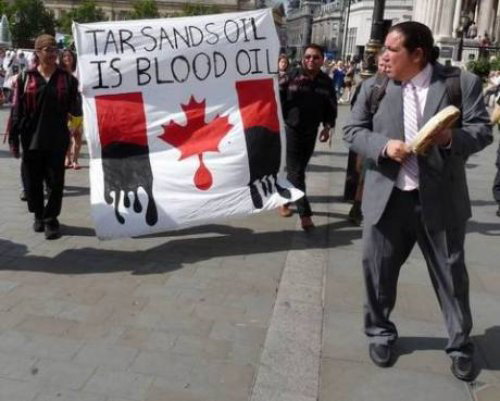
Clayton Thomas-Muller (right) and George Poitras (centre) with fellow Indigenous representative Lionel Lepine, protesting at BP’s HQ in September 2009.(New Internationalist)
More critical questions followed, perhaps the most staggering from Louise Rouse from FairPensions, who revealed that BP’s projections for making their tar sands project profitable is based on a scenario that assumes no government action on climate change, and as a result a 6° temperature rise which carries with it catastrophic climate change. In other words, BP is betting on the end of the world as we know it. Surely this should be of concern to shareholders?
BP’s response was pitiful. The chairman delivered a pre-prepared presentation reiterating their oxymoronic commitment to ‘responsible tar sands extraction’ to meet future oil demand, and failing to address any of the questions had just been put to them — a tactical error, in my opinion, because it made them look like they didn’t have any answers.
And now, the moment of truth. There should have been a drumroll really, as Svanberg revealed the votes for and against the resolution. 6% of shareholders voted for it, and nearly 10% abstained, adding up to a very significant shareholder rebellion despite BP’s best efforts. Shareholder resolutions are extremely frowned upon by the financial establishment, and even abstaining is viewed as an act of serious dissent. So BP may have won the vote, but they clearly haven’t won the argument. Afterwards, Catherine Howarth, director of FairPensions, reflected on the significance of what they had achieved. 'Shareholder resolutions are primarily a means to draw attention to an issue of concern to investors.' she explained. 'The vote today is only one outcome of a wider process, which has catapulted tar sands risks to the top of BP’s agenda, and has become a major topic of debate in the City.'
Tête-à-tête with the Board
As soon as the formal AGM business ended, I went over to congratulate Clayton and George on asking such hard-hitting questions. But the chairman himself beat me to it! All smiles and easy magnanimity, he told them their presence was extremely welcome, and that he’d listened to everything they said very carefully. When George pointed out that he hadn’t actually answered any of the questions, he sidestepped the issue by offering to introduce them to the key board members responsible for the company’s move into the tar sands.
Thus George, Clayton and other members of the FairPensions coalition were treated to a 20 minute tête-à-tête with Andy Inglis, BP’s Head of Exploration and Production. His strategy was clearly to give as little away as possible; ‘this is interesting input,’ ‘let me think about it,’ ‘today was not about the votes, it’s all about discussion,’ ‘I learnt something from today’ etc.
CEO
Tony Hayward, who was subsequently cornered by one of the group, was
taking a less conciliatory approach. ‘You’re wrong!’ he snapped,
attempting to make his escape as quickly as possible.
Get away from me, Bolsheviks!'
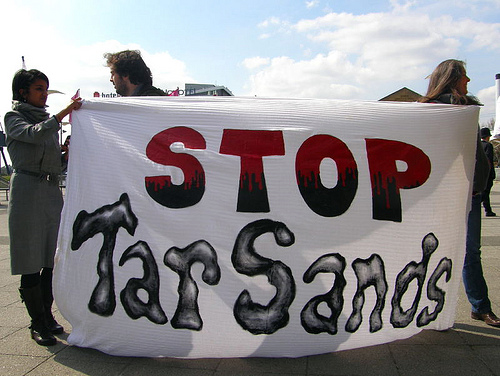
A recent explosion of public concern. (New Internationalist)
As shareholders left, the activists outside asked them how they had voted. The responses varied dramatically, from ‘get away from me, Bolsheviks!’, to ‘I’m satisfied that BP has it under control’, to ‘I voted for the resolution — I’m really unhappy about this’. You can see the range of views in this wonderful little film.
Ultimately, BP are faced with a serious problem. Despite their most concerted efforts, they failed to prevent a significant shareholder rebellion that indicates serious disquiet around the decision to go into the tar sands. I expect they’re hoping to ride out the storm, wait for the campaign to shrivel away and then quietly give the project the go-ahead. But given the recent explosion of public concern, I don’t fancy their chances.
